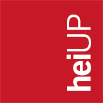Archives
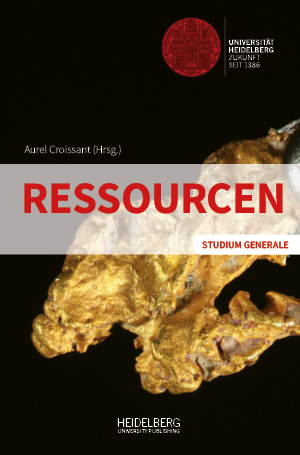
2019 (2021): Ressourcen. Rohstoffe, Daten, Menschen
Studium Generale is a series of lectures at Heidelberg University open to all members of the university and any other interested members of the public. The lecture series has a general topic that academics from different fields take up in individual presentations from the angle of their discipline. “Resources: raw materials, data, human beings ...” was the topic of the Studium Generale of Heidelberg University in the 2019 summer semester. The collection of essays in this volume arose in the context of this lecture series. They represent the broad range of different disciplinary approaches to the topic in academic research und in societal practice.
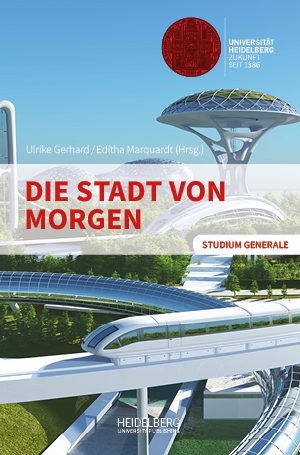
2018 (2020): Die Stadt von morgen
Looking at the cities of tomorrow has many facets. Their enormous growth, as well as pressing challenges such as increasing mobility, digitization, and sustainability, confront us with the question of how we envision the livable city of the future. This volume is intended to stimulate and inspire an engaged debate from diverse perspectives, such as architecture and literature, geography and health, anthropology and planning, and environmental science and energy about a city for people. What kind of visions do urban planners develop? How can academic knowledge and science contribute to an open and equal city? This book provides some ideas, concept and thoughts from a diverse range of actors and scientists.
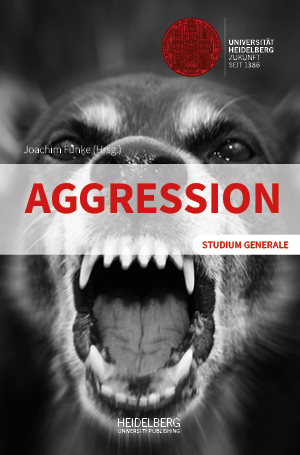
2017/18 (2020): Aggression
We live in a world full of aggression. Not a day goes by without us hearing about conflicts between people, and we only take a marginal note of the weaker and more subtle forms of violence. Has the earth’s potential for violence really increased? According to serious researchers and relative to the growing world population, it has even decreased. Reason enough to take up this topic from the perspective of various disciplines within the framework of the „Studium Generale“.
Aggression appears in very different contexts. This can be due to the influence of gender stereotypes in couple relationships or viewed from the angle of criminology or the influence of norms and religious values; there are negative and positive effects of aggression in road traffic or the question of protection against aggression in (social) media; and the view from biology also sheds light on the role aggression plays in the animal kingdom and whether this might not ultimately enable reflection on our lives.
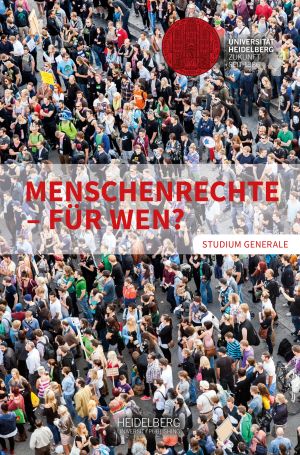
2017 (2019): Menschenrechte - für wen?
Developing values, translating them into phrasing and codifying them in institutions is basically an amazing process. The fact that the International Criminal Court was able to emerge in The Hague, for example, is due to a long development process. A process that evolves not least from the experience of the wars and war crimes of a technological world. The number of human rights instruments has increased, but at the same time a closer look also shows the fragility of these instruments. Many influencing factors are to be discussed here - from the trend towards authoritarian statehood to economic globalization with all its attendant circumstances. And the development does not stop. For example, how does a society deal with religious diversity against the backdrop of developed human rights?
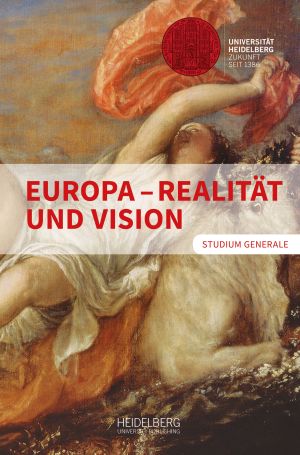
2016/17 (2019): Europa - Realität und Vision
Europe the woman, Europe the house. Europe as a dream, hope and necessity. Europe has many faces and there are many different parables for what Europe and what the European Union is and should be. The University of Heidelberg has invited scientists from various disciplines to comment on the subject of "Europe - Reality and Vision" within the framework of the Studium Generale, focusing on different aspects such as minorities and civil rights, migration, Germany's role in the European integration process or the common foreign and security policy after the Brexit referendum. The view from Russia to the European Union as well as Chinese and European perspectives on each other releases a wealth of historical conditions, images and role models, whose effectiveness should not be underestimated. The plea for a new foundation of Europe is thought-provoking.
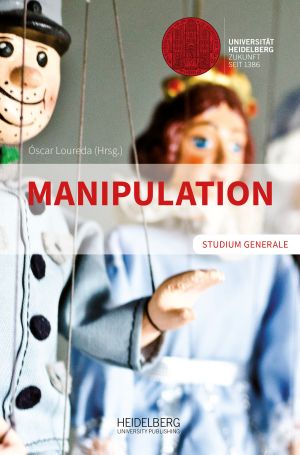
2016 (2018): Manipulation
Óscar Loureda (Hrsg.)
Der amerikanische Science-Fiction-Autor Philip Dick hat Vorlagen für Kultfilme wie Blade Runner oder Minority Report geschrieben und dabei mit prophetischem Blick und großer Phantasie Szenarien vorausgesehen, in denen unsere Gegenwart durch gezielte Manipulation zum
Albtraum wird. Verdeckte Einflussnahme, also alle Prozesse, die das Erleben und Verhalten von Einzelnen und Gruppen ohne deren Wissen und Zustimmung steuern, nennen wir Manipulation. Sie ist das Gegenteil von Erkenntnis und wissensbasierter Meinung.
Wie weit hat Science-Fiction die Realität eingeholt? Wie frei treffen wir unsere Entscheidungen? Wie sehr setzen wir dabei auf Wissen und Tatsachen und wie sehr auf vermeintliche Gewissheiten und gesteuerte Meinung? „Manipulation – wie frei sind wir wirklich?“ lautete die
Fragestellung des Studium Generale im Sommersemester 2016. Dazu wurden Vertreterinnen und Vertreter unterschiedlicher Disziplinen wie der (Kunst-)Geschichte, der Germanistik, der Medizin oder der Wirtschafts- und der Rechtswissenschaften eingeladen, um aus der Perspektive ihres Faches das Thema auszuleuchten. Das Spektrum der Vorträge reichte von Fälschungen in der Kunst über Manipulationen in der Wirtschaft und im Gesundheitswesen bis eben hin zur Steuerung der öffentlichen Meinung. Zu den Referenten gehörten neben Wissenschaftlern der Ruperto Carola auch Fachvertreter aus Berlin, Erfurt und Halle-Wittenberg.
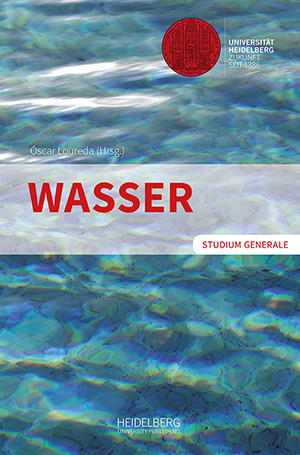
2015/16 (2018): Wasser
Óscar Loureda (Hrsg.)
Als archē, den Ursprung allen Seins, bezeichnete der griechische Mathematiker und Naturphilosoph Thales von Milet (um 625–545 v. Chr.) das Wasser. Er war der erste, der Ursprung und Ende des Alls auf ein einziges Element zurückgeführt hat, denn „aus Wasser, sei es in festem, sei es in flüssigem Zustande, bestehe das Universum“.
Der größte Teil der Oberfläche unseres Planeten ist von Wasser bedeckt. Davon entfällt auf das Salzwasser der Weltmeere mehr als 96 %, der vergleichsweise kleine Rest ist das für uns Menschen so kostbare Süßwasser. Wasser ist Leben, knappe Ressource, Ware, Ursache von Konflikten weltweit: Entsprechend vielfältig sind die Forschungsschwerpunkte und fachlichen Expertisen der Wissenschaftlerinnen und Wissenschaftler, die im Rahmen des Studium Generale zum Thema „Wasser“ im Wintersemester 2015/2016 nach Heidelberg eingeladen wurden. Vertreten waren die Ingenieurwissenschaften, die Geographie, Biologie, Umweltphysik, Politikwissenschaften, Agrarwissenschaften und Rechtswissenschaften. Neben Kollegen der Ruperto Carola trugen Referentinnen und Referenten aus Halle-Wittenberg, Hohenheim, Karlsruhe und München ihre Sicht auf das Thema vor.
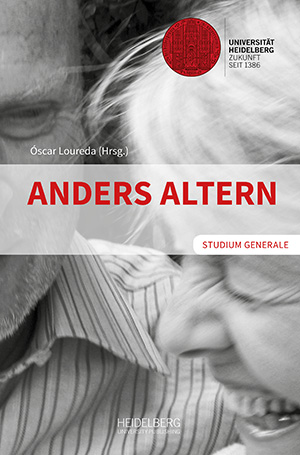
Aging the other way
Óscar Loureda (ed.)
Everyone wants to grow old, no one wants to be old, it is said in a folk wisdom from China as well as from Africa, Latin America or Europe. People grow old around the whole world. But in doing so they are assigned very different roles in the social and cultural context as well as possible alternative concepts of the design of this life stage are also characterized by religious, cultural and social attributions.
"Aging the other way" – was the motto of the nine lectures of the "Studium Generale" to which the Heidelberg University invited in the summer semester 2015. Scientists of the Ruperto Carola as well as other universities in national territory and abroad looked at various aspects of aging from the perspective of their respective disciplines from dealing with aging and elderly people in Asia to ethical considerations of age to presentations of the subject in contemporary literature. The series of lectures was designed by employees of the research project "Aging in the Transcultural Context" which is located at the Cluster of Excellence "Asia and Europe in the Global Context" of the Heidelberg University.
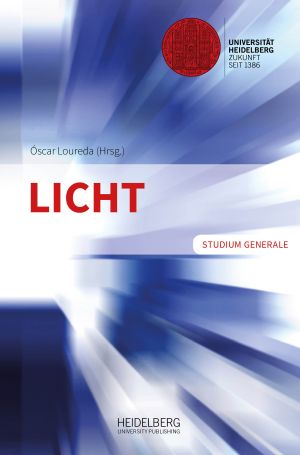
Licht
Óscar Loureda (Hrsg.)
In the winter semester 2014/2015 Heidelberg University’s “Studium Generale” covered the subject of light. Dealing with the question “what defines light,“ physicist Rolf Heilmann gives an overview of different concepts that were used to approach the phenomenon of light in the interaction of religion and art, philosophy, natural sciences and technology in the course of centuries. Art scholar Michael Hesse discusses the subject of light from an architectural perspective through the ages as well as in connection with psychologizing of architecture. Matthias Bartelmann from the Centre for Astronomy of Heidelberg University talks about gravitational lensing in the universe and Johann Kreuzer’s lecture deals with light as a metaphor in philosophy.

